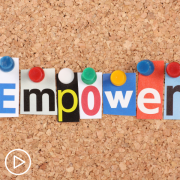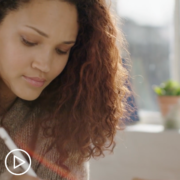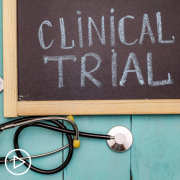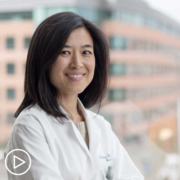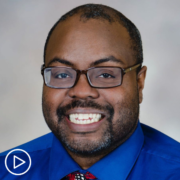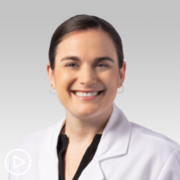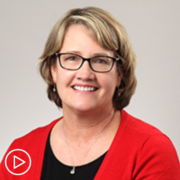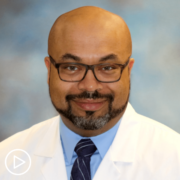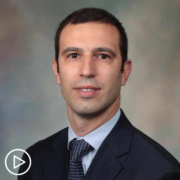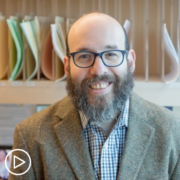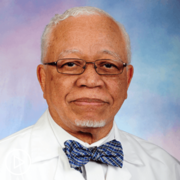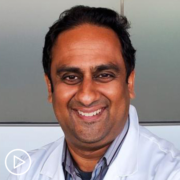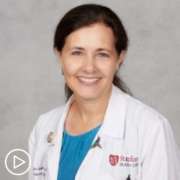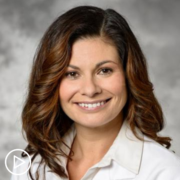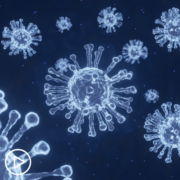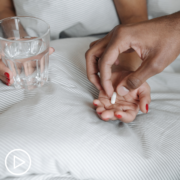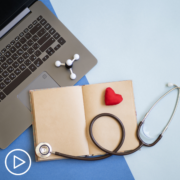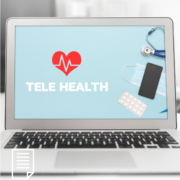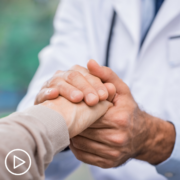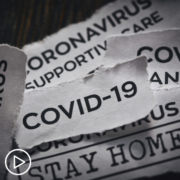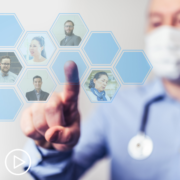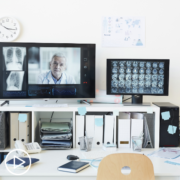MPN Specialized Care and Technology: Digital Health and Symptom Management from Patient Empowerment Network on Vimeo.
Nearly 80% of patients living with a myeloproliferative neoplasm (MPN) are affected by fatigue. Can digital health alleviate symptom burden in MPN care? What exactly is mobile app intervention, and how can it help me? Dr. Krisstina Gowin and Dr. AnaMaria Lopez discuss technological interventions in MPN symptom management, telemedicine limitations and the importance of connecting with an MPN specialist.
See More from MPN TelemEDucation
Download Resource Guide
Related Resources:
Transcript:
Lisa Hatfield:
Welcome to this Patient Empowerment Network Program, I’m your host Lisa Hatfield. In this unique program, we explore cancer care and technology, specifically the importance of specialized care in myeloproliferative neoplasms, MPNs for short, and the role of digital health in symptom management. Today, I’m joined by two incredible experts, Dr. Krisstina Gowin is a hematologist, oncologist treating MPNs. I’m gonna shorten that, simplify it, treating MPNs. Dr. Gowin is Assistant Professor of Medicine at the University of Arizona. And Dr. Gowin it’s such a pleasure to connect with you.
Dr. Krisstina Gowin:
Oh, it’s such an honor to be on today and connect with you all. Thank you so much for having me.
Lisa Hatfield:
Also joining us is respected oncologist, Dr AnaMaria Lopez, Professor of Medical Oncology at Sidney Kimmel Cancer Centre, Thomas Jefferson University. Dr Lopez is a telemedicine pioneer as the founding medical director of the Arizona Telemedicine Program. Welcome, Dr Lopez, thank you for being here.
Dr. AnaMaria Lopez:
Thank you so much. So looking forward to the discussion.
Lisa Hatfield: Thank you. So, Dr Lopez, I’d like to start with you to talk about cancer care and technology and how far we’ve come with technology and cancer care. We’ve made a fair number of strides in cancer care as they relate to digital health. Can you speak to that a bit?
Dr. AnaMaria Lopez:
Sure. I always say that the COVID pandemic allowed us to advance telehealth in a couple of months what probably would have taken 70 years. So we went from maybe 10% of the visits being done through tele to 90% plus. So a huge, huge change, and a lot of lessons learned, both in the, how do we do it clinically as well as how do we integrate this? How do we integrate this into clinical trials and to move beyond? We really thought telemedicine and really thinking telehealth because there are so many technologies, so there could be monitors, there could be… A lot of us were doing work in patient-recorded outcomes, how do you integrate that? How do you make it easy for patients to use this? And maybe it’s not simply the patient, but it’s also the patient and the caregiver who can help with this reporting. What are really the implementation efforts that need to be done? I could go on and on because there are so many lessons learned and it really shook things up. So people are thinking of this as a new technological revolution. So technology plays a big role in care and certainly a very big role in cancer care.
Lisa Hatfield:
And just out of curiosity, Dr Lopez, do you have a lot of your patients who still continue to see you via digital health or telehealth, who prefer that?
Dr. Krisstina Gowin:
Yes. Yeah. For example, in some of the psychiatry literature, which I think is a little bit unexpected ’cause you think psychiatry is such an intimate interaction. Well a lot of patients actually feel safer when it’s digital, when it’s through tele. So yeah, I do. And we were talking earlier about doing integrative medicine, and almost all of my integrative medicine patients, we do at a distance. I really think of it as it’s a way to bring back the house call.
Lisa Hatfield:
Yes. Well, thank you for that overview, Dr Lopez. So the pandemic has resulted in significant changes to many aspects of daily living for many of us, but for patients living with cancer like myself, there are different realities that we’ve had to deal with. Do we go in for our monthly blood draws, or do we wait a couple of months? So question for Dr Gowin, can you give us an overview of the impact that Covid-19 has had on MPNs or MPN care?
Dr. Krisstina Gowin:
Absolutely. Well, there was a really wonderful study that was done, really led out of Mayo, by Jeanne Palmer and Ruben Mesa, and it was an international study, and it looked at 1500 MPN patients. And they asked questions like, how many of you are actually having telemedicine? And this was in 2020, kind of at the beginning. And over half of them had already been engaging in telemedicine. And about a quarter of them felt that their care actually was delayed a little bit and that there were actually consequences to that delay, so that really speaks to an international kind of change in the paradigm of how we’re delivering care for MPN patients. The other thing is the lockdowns, the lockdowns that were occurring for us here in the US and really internationally. And what they did is, they asked patients their MPN symptom burden, and those that were on lockdown, not surprisingly I think to all of us, had a significantly higher symptom burden.
So I think that really speaks to that A, yes, there was a very large impact of COVID on the development of telemedicine and the need for telemedicine. But it also underscores the need for symptom management that we now have a group of patients that are having a higher symptom burden, probably likely secondary to more sedentary behavior, more anxiety, more depression, but a higher symptom burden because of COVID. And so we really need not only more therapeutics and perhaps non-pharmacologic interventions to support their symptom burden, but it needs to be delivered on a digital platform.
Lisa Hatfield:
Thank you for that, Dr. Gowin. So you brought up a really good point, and this is a great segue to talk about integrative health. So I have multiple myeloma, and of course that comes with side effects from the different therapies and symptoms of their own. We have a great integrative health center at our cancer center here locally where I live, and I’ve used it for acupuncture for some of my symptom management. I’ve also watched you on different platforms, through webinars and patient support groups where you describe different integrative health techniques and that type of thing. So I’m wondering… Two questions. The first part is, what symptoms do MPN patients face the most? And then how can they use integrative health to do that, particularly as it relates to telemedicine? Are there telemedicine options for integrative health? I suppose things like acupuncture, maybe not, but other types of integrative health, and can they get a consult for integrative health? Can they even go as far as getting a consult? So if you can answer those questions, the symptoms they face, how to use integrative health, and if they can get a consult for integrative health, that would be great. We’d appreciate that.
Dr. Krisstina Gowin:
Yeah. Well, Lisa, I wanna take a moment just to validate your journey that you’re going through and to congratulate you for your self-advocacy to go look for those integrative therapies to support yourself. And for MPN patients, I will say that it’s a really unique group, and so all cancer patients experience symptoms, but in myeloproliferative neoplasms, it’s really kind of this heterogeneous what we call a symptom burden. And so most patients will experience fatigue about 80% of MPN patients. But then beyond that, there’s really a whole slew of different sequelae that can be associated with the disease, which you may or may not think about when you’re thinking about MPNs, such as psychosocial issues, sleep issues, sexual issues.
And then we have kind of the classical issues that happen with MPNs, such as dizziness, but we talked about the fatigue, bone pain, itching, abdominal discomfort from an enlarged spleen and early satiety, or feeling full quickly. It’s really a huge symptom complex, if you will. And we now have validated measurement tools to better understand those. It’s the MPN symptom assessment form, which has really, I think, revolutionized how we look at MPN. It’s no longer just treating the blood counts. We’re treating the patient as a whole, and even within our NCCN guidelines, kind of how we as oncologists go through the algorithms of how to change therapy and how we look at patients. We now have symptoms in there. So even if blood counts are controlled, we may change therapies or even do a bone marrow based on symptoms alone. So symptoms are a huge thing in MPN. So getting to your second question for integrative health.
So I think that MPN… The patients in the community are really early adopters for digital engagement, which is fantastic. Everyone’s very engaged and I’ve had the opportunity to work on meditation apps, yoga apps, a wellness based app here from the University of Arizona, and patients just really accrue fast. Everyone’s so excited. And most of these, though, were very small kind of pilot trials, looking at feasibility, can’t we really do these things? But most of them as well are showing some impacts on depression, anxiety, sleep, and total symptom burden. So I do think that these modalities through digital platforms certainly can make a difference on the symptoms. And we’ve seen that with meditation. We’ve seen it with yoga and we’ve seen it with a seven domain wellness app. And is it the digital engagement? I don’t think so.
I think it’s likely the integrative therapies that they’re receiving through that platform, right? We know meditation works, we know yoga works, perhaps not so well in MPNs. We need to build that evidence base, but other solid cancers, we know those interventions really work. But it’s wonderful to get that kind of early data, say it not only works, but it also works when you’re doing it at home, when you’re doing it on a digital platform. And so I would encourage all patients listening to this to, yes, look at what’s around you, what are the resources, what are the clinical trials? Looking at these different digital modalities for integrative medicine, but also to go get an integrative consultation.
And as Dr. Lopez already had mentioned, she does all of her integrative medicine via telemedicine now, which is fantastic. And so you, it’s really, it’s that you know, your fingertips. You now have access to wonderful oncologists like Dr. Lopez to guide you in this journey. And the journey is not only allopathic western medicine, but it’s treating you as a person, you as a whole symptom complex. And that’s really what integrative medicine aims to support you through.
Lisa Hatfield:
Thank you for that. Dr. Gowin. So you talked about an app that patients can use. Is this app accessible to any patient or is it just within a trial or a study that you’ve done?
Dr. Krisstina Gowin:
No, it is widely accessible. It is free, even better. [laughter], it’s called my Wellness Coach. And that’s…
Lisa Hatfield:
I’m writing that down. Okay. [laughter]
Dr. Krisstina Gowin:
Yeah. Yeah. It’s really wonderful. Many domains of wellness. It’s based on motivational interviewing and smart goals. It gives you little reminders of, hey, and you set your own goals, which is wonderful.
Lisa Hatfield:
And what types of interventions then does that contain? Does it have things like you said, meditation and does it have a yoga program for patients? Or what types of interventions?
Dr. Krisstina Gowin:
Not quite yet. I think that that’s what we aspire to is really this multidimensional intervention. It’s not really an intervention. It’s looking at your life. It’s saying, “what are you eating? What are your nutrition goals? How are you moving? What are your exercise goals?”
How is your resiliency? How is your spiritual health? How are your relationships? And so it’s asking all of these domains of what our wellness is and helps to identify where perhaps you would like to devote more time and energy to, and also gives some resources and education around each of those domains and why they’re so important. But you set your own goals and then…
Lisa Hatfield:
That’s great.
Dr. Krisstina Gowin:
You’re accountable for your goals.
Lisa Hatfield:
Great. Well, thank you so much for that information. And you mentioned that Dr. Lopez also does her integrative health via telemedicine. So I’m gonna ask Dr. Lopez, can you speak to that a little bit more? How do you do that with patients? Do they just contact you and set up an appointment for an integrative health consult or appointment? And do you conduct some of that yourself or do you send them to particular resources in the community?
Dr. AnaMaria Lopez:
Sure. So, yes, patients can make an integrative oncology appointment directly. I really like to do the consults through tele simply because I can… As I was mentioning, it’s like a virtual house call to really get a sense of the patient. Often a partner, significant other, caregiver might be present as well and as we know there’s the survivor and there’s the co-survivor. So including both can be very helpful to some people and I think the initial intake… Again as Dr. Gowin was saying it depends so much on what the person wants to do. So the first opportunity for coming together is simply, where are you? What are your goals? What’s important to you? And of the panoply of options, which might be the easiest or the one that you are most interested in.
And so depending on what it is we might work together, we might also bring in others if the person is really interested in making lifestyle changes, let’s say related to nutrition. The person might work closely with a nutritionist for some period of time and then come back and we’d come together and reassess. You mentioned the acupuncture and you can’t do acupuncture at a distance, but you can certainly teach people about the points and consider acupressure for certain points. So there’s so many ways to engage and interact, but yes, I think like a lot of medicine, it’s a team-based approach.
Lisa Hatfield:
Great, thank you. Dr. Lopez. I do have to say with acupuncture, one of the side effects of a lot of the cancer medications is neuropathy. And a lot of patients like myself try every option, every pharmacological option, whether it’s gabapentin or something else, and they don’t work an acupuncture for me anyway, personally. I had a significant reduction in the painful neuropathy… Not so much in the tingling, but a significant reduction that, so I am very strong advocate for integrative health. So thank you for explaining that a bit more and as long as we have you on Dr. Lopez, can you also speak more broadly to innovative telehealth tools that are making an impact on symptom management and overall cancer care?
Dr. AnaMaria Lopez:
Sure. So one of the things that we know, is that for example, people have appointments every three weeks, or they have appointments once a month with the oncologist, and a lot can happen in that time. So setting up systems that are assisted by technology, so that patients can report their symptoms in real time can be very helpful. And some of this may require… It may not be a common way where the person may be familiar going to a computer or going to their phone to kind of say, “This is how I’m feeling.” So that may require some engagement education, but often regardless of age, regardless of background, people find that really easy and find that so helpful to be able to say, “Oh, was it two weeks ago that I had that?” As opposed to just saying, “Hey, I just had this,” and then it can happen anytime day or night that the patient can report. And that way there’s… It’s just so helpful to have an intervention in real time.
The other part that’s good is that often some of these systems can kind of track. So we can look at it together and say, “You know what? Your fatigue tends to be a couple of weeks after therapy, so how can we either prepare for that?” Or just to have the reassurance that, “Yes you have that depth, but it gets better and you get through it.” So being able to look retrospectively and identify that can be helpful and I think also just the ease for people to be able to connect with multiple specialists, sometimes to have multidisciplinary visits where not only does the patient meet with everyone, but the patient can see that we are all meeting and interacting together. So all of those are incredible tools, one of my favorites though, one of my favorites is patients who are in the hospital and patients who are in the hospital a long time, on some occasions. So and even if a person’s not there a long time, it can feel like a long time, so to use the technology, not just to connect the patient, the healthcare team, but to use the technology to connect the patient with his or her family. And I think especially… I mean, a lot of people have smartphones, but it’s using your minutes, sometimes the internet may not be so strong. So to use the technology that would be used for the clinical piece to have that available in the inpatient setting so that patients can feel connected.
Lisa Hatfield:
Yeah, that’s a really great thought that you brought up, too. I know when the pandemic was in full swing, but patients were starting to go back into the office to see their provider. For me, I was not allowed to take my husband in with me, so I went in alone. I was far enough along in my journey. I didn’t necessarily need a care partner with me, but some patients do, maybe a newly diagnosed patient. So that is a really great point. Say, a patient has to come in by himself or herself, is that a technology they can use? Are you willing to let them use their phone to maybe FaceTime during that call or we had to use the actual physical landline because my phone did not connect, the signal wasn’t strong enough. But do you allow that during your appointments to have patients contact somebody?
Dr. AnaMaria Lopez:
Absolutely.
Lisa Hatfield:
Okay. That’s great. Yeah.
Dr. AnaMaria Lopez:
And also there’s pandemic, but there’s also… People live everywhere. So you could say their sun could be in California and I’m in Philadelphia and this way it’s okay, we’ll just beam them in.
Lisa Hatfield:
Yes. Well, thank you for that information. And some patients might be a little more reluctant to use telehealth or telemedicine. How can patients and their care partners feel more confident in voicing their concerns or communicating with their healthcare teams regarding any telemedicine options that are out there?
Dr. AnaMaria Lopez:
So you mentioned that I had been the founding medical director of the Arizona Telemedicine Program, and it was such a wonderful experience because skepticism and I really respected that. It was brand new and we had our system in the library. And the library, it was down in the basement, so it was very metaphorical. I would meet the new clinician at the entrance of the library. We would walk down the stairs together and often, the conversation was, “Okay, I’m doing this for you. I’m doing it one time. We’ll see how it goes.” And I was always so reassuring that if for some reason,’cause ultimately the clinician needs to feel comfortable, yes, this works, or no, it doesn’t. And if you have any doubt and you feel that you need to see the patient in person, you just need to say that, I need to see the patient in person. And inevitably as we’re walking up the stairs, “Oh, I know you called me because I was on call. Just call me anytime. Don’t call the on-call person”. This was great. I loved it.
So inevitably, people really like it and it’s good. You see the patient in their own environment, you can interact. You often get insights that you may not have gotten otherwise just because of where you are and how comfortable they feel in their own space. So I think, for me it’s the proofs in the pudding. Give people the opportunity, have the right supports and technology in place and often it’s a very positive experience.
Lisa Hatfield:
Great. Thank you Dr. Lopez. So Dr. Gowin, a couple of questions for you. Is technology playing a role in accelerating progress in MPN care?
Dr. Krisstina Gowin:
Oh, absolutely. And I think some of the ways that it really accelerates progress is pulling us together. So what we need to recognize is that myeloproliferative neoplasms truly is a rare disease and we just celebrated Rare Disease day. But there’s a lot of challenge in treating patients and progressing the field forward in rare diseases because you can’t do the big clinical trials. It’s hard to come together ’cause everything’s siloed and there’s just a couple patients here, a couple patients there in each practice. But with digital health and clinical trials that are offered on a digital platform, it pulls the nation together and even the world together. And we’ve seen that. I’ve done a international survey-based analysis and I had 858 MPN patients from 52 countries participate in that survey. And so that just shows how it pulls the world together. And for the web app that we just discussed, we had 93 patients say they were interested within three weeks, and within actually a week, we identified them all and then took three weeks to actually accrue them to the trial. So it really speaks to A, how MPN patients are digitally engaged and excited about these kinds of platforms. And then B, how effective it really can be to pull the groups together.
So yes, I think it’s… And that’s really how we’re gonna get progress is through these kind of interventions with a rare disease. And I hope it’s okay if we jump back to something you said, Dr. Lopez, which is, I think telemedicine is so so important to bring everyone together. And in particular, I see that on the transplant ward. And so in myelofibrosis, that’s the only curative therapy. And so many myelofibrosis patients actually go through allogeneic stem cell transplantation. And my goodness, that is a socially isolating experience. Patients are in the hospital, not uncommonly for at least 30 days and then have to be near their transplant center for three months, which often is away from home. So to pull in their support system, both through the acuity of the transplant themselves and then the couple of months after is so crucial to a successful transplantation. And I think through FaceTime and also the MPN support groups, which is very robust, the patient advocacy and the way the MPN network sticks together on a digital platform, I think is really unique and offers unique support.
Lisa Hatfield:
Thank you. And then what role does technology play in the disease symptom management, and in particular, in clinical trials too. What role does technology play with clinical trials?
Dr. Krisstina Gowin:
Well, I think it helps us through different, clinical trial accrual patterns, we can see who’s eligible where, so it helps us identify patients. It helps us to, understand the different kind of precision based medicine approaches so we can start to pool the data, say for, particular mutations… ASXL1 mutations. And so it helps us in the precision medicine aspect of clinical trials and now we’re looking at symptom management and how do we really integrate that. So large survivorship platforms like Carevive, if you’ve ever heard of Carevive, is now integrating our validated symptom assessment form into the Carevive platform. So now we can really collect that data and use that to mine it for potential kind of retrospective analysis. So it’s helpful for clinical trials as well as for our clinicians and clinics to really identify changes in symptom burden.
And just as Dr. Lopez was mentioning, that we can track these over time and it can flag and say, “Oh, your symptoms are changing, they’re increasing over time,” and maybe we need to be thinking about that. And so Carevive is really kind of a electronic medical record driven it’s really a healthcare driven platform, but now there’s patient ones too. And I just learned about this two weeks ago, I was at an MPN conference in Phoenix and learned about MPN Genie. And so MPN Genie apparently is tracking… Patients are putting their symptoms in and that’s shooting that information to the electronic medical record to their doctors. And so I think that’s fantastic, ’cause, we now get that information real time and we can change our clinical management, maybe bring that patient in sooner, maybe do a bone marrow earlier. We never would’ve identified that if it weren’t for those kind of digital engagements, so I think it’s a really exciting time. And I think we’re gonna see more and more of these new platforms and ways for different EMRs and smartphones to be communicating back and forth between patients and providers.
Lisa Hatfield:
Great. That MPN Genie is fascinating to me that we can have that real-time communication going back and forth as a patient, I would love that. So going back to clinical trials, I’m curious if you think that, technology has progressed enough, so in the past… Say I’m an MPN patient or a myeloma patient, I see a clinical trial or hear about one, I have to be onsite for that clinical trial for monitoring maybe for six months to a year. Do you think that technology has progressed enough that clinical trials might allow a patient to be at home, maybe in a more remote area and monitored remotely? Whereas in the past, that same clinical trial required them to be at the facility? Do you think that we’ve progressed to that point in some clinical trials?
Dr. Krisstina Gowin:
You bet. Yeah. I think COVID out of necessity has forced us to do that. And I have in my own clinical trials, even with pharmacologic clinical trials conducted telemedicine visits that were approved by the sponsor. So the paradigm is shifting, and particularly when it is oral therapeutics, I think that’s really accessible when they’re, IV subcutaneous, I think that has different challenges. Obviously you can’t do that as remote, but when they’re oral therapeutics are non-pharmacologic intervention, such as our integrative interventions, I think it really lands well to a more remote experience.
Lisa Hatfield:
Okay. And then would that require communication between the local oncologist and maybe someone like yourself, the investigator on that clinical trial to know what is going on with that particular patient? I assume that that communication would be ongoing?
Dr. Krisstina Gowin:
Absolutely. Always.
Lisa Hatfield:
Okay. Yeah. All right, great. Well, thank you for that information. So, Dr. Lopez, kind of a similar question for you. What are some examples of how technology is influencing cancer care right now?
Dr. AnaMaria Lopez:
Yeah, let me just add on the clinical trial question.
Lisa Hatfield:
Oh, Yes.
Dr. AnaMaria Lopez:
That there’s also the opportunity. Again, there were so many things that we thought, “Oh no, we just can’t be done.” But because of the necessity, necessity is the mother of invention, we do remote consent, so that was a big deal in the past. We can also do a tele visit ahead of the appointment, and screen for the cancer clinical trials, people travel large distances for studies and instead of traveling four or five hours, and then to be told, “Oh, actually you don’t meet the criteria.” To be able to do all of that at a distance, to get the records, to get the images, to review all that needs to be reviewed. And then to say yes, and not only yes, but we can also do your consent at a distance in some situations.
And then when you come, there’s actually the more substantive, perhaps even the treatment. There’s also a large, movement around hospital at home and that these patients that are eligible for that would be able… With digital support, be able to get hospital level care in some cases at home. So some of that may involve infusion, some of that… Again, but that visual connectivity and in the past you really had to kind of conceptualize it and it was kind of space aging to talk about it. But we now, we’ve all done FaceTime, so I think we all really can understand what it entails, so tremendous shifts and, we wanna try to keep that momentum going for our patients. So, I do think that, there’s so many ways that technology has impacted cancer care, even when we talk about the electronic record and patients accessing the electronic record and patients having the opportunity to go into a portal and to see their labs, to see their reports…
To be able to track their changes. All of that is really, really powerful. You know, patients with… The most common I think is patients with diabetes who track their blood sugar sometimes to the minute and they can say, “Oh, I ate that and now I see the impact.” So the opportunity for monitoring, the opportunity for also bringing in experts. So let’s say there’s a patient with a rare disease and the expert is elsewhere, there might be the opportunity to bring people together. We do tumor boards. That’s just part of what we do in cancer care. And also as many… There are health systems now so that it’s not one hospital, it’s multiple hospitals together where we can bring all of those folks together, bring in local expertise, regional expertise, national expertise, all for the patient’s benefit.
So there are so many ways that technology even something as simple as the note. Now this is something we experimented with and it’s still in experimentation phase, but there were these Google classes where you could interact with the patient and as I’m talking, the Google glass would record kind of the conversation and would come up with some sort of a structure for the note. So for what that encounter had been like. So there are lots of ways of how do you capture natural language in real time to really help the workflow, the documentation process. So I think there’s aspects to help the patient, to help the families, to help the clinical teams and to help everybody work together.
Lisa Hatfield:
Great. Thank you. And you talked about the patient portal and I’m one of those patients at fault of seeing a lab result before my doctor saw it and calling him or sending a message via MyChart saying, “Hey, this is going up. What’s wrong with this?” So I’m sure you don’t have to mention any names. I’m sure you’ve seen the challenges of, digital health too, are having that patient portable or portal accessible to patients. So anyway, just wanted to throw that out there that I’m sure that brings challenges to you. Also few little challenges here and there.
Dr. AnaMaria Lopez:
But at the same time, that’s so good, right? It’s so good that patients are engaged. It’s so good that you’re engaged. And I think as long as, we’re communicating that yes, you may see this before me, so you may have questions and then, we just get together and answer the questions.
Lisa Hatfield:
And thank you for saying that Dr. Lopez, because a lot of us patients who do that occasionally feel a little bit guilty for sending a note right away to our doctors. “We know you’re busy. We know you’ve already, you’ll look at those labs. If you’re concerned, you’ll call us or let us know”. And sometimes we jump the gun a little bit. So thank you for reassuring us that that’s okay, that that’s okay to do that. So we appreciate that. So Dr. Gowin, do you have anything to add on, how MPN care or just cancer care in general could change with different technologies? We didn’t touch a lot on things like artificial intelligence and that type of thing, and we can speak to that or, any other type of technology that you’re familiar with.
Dr. Krisstina Gowin:
Well, I think the artificial intelligence aspect is really going to change the paradigm again on how we’re designing, studies. And I think one of the biggest challenges that we have in myeloma and as well as myeloproliferative neoplasms, is to think about how do we optimally sequence our therapies to achieve best survival, right? And I think this is a wonderful problem to have. We have now not only one JAK inhibitor on the market, but several and more in the pipeline and several other therapeutic targets. And so now the question is which therapy and when do we employ it? So things like artificial intelligence will help us to answer that question with machine learning decision tree analysis, all of that is going to be answered through those kind of platforms. And so I think that is going to be a shift we will see in the next five years is many different machine-based learning algorithms to better understand those problems we cannot have tackled traditionally otherwise.
Sensors though is another one, right? And so a big thing in MPNs is not only addressing the blood counts and reducing risk of thrombosis, and to address symptom burden, but it’s really addressing lifestyle because it’s things like cardiovascular disease, stroke that really we’re worried about as some of the sequelae of having the disease and what we’re trying to prevent with therapeutics. And so even going back to this NCCN guidelines, it’s addressing cardiovascular risk factors as part of our core treatment goals. And so how do we really do that? And it’s really through lifestyle medicine and that’s where the sensors come in. And so now we have, these Fitbits and smartphones that connect to our Apple watches and we have Garmins and all these wonderful devices that are prompting us to move more, prompting us to be cognizant of our heart rate and stress response prompting us to meditate. And so I can envision those evolving over time and connecting to the EMR and being very seamlessly interwoven into our clinical trials. And we’re already doing that. In fact, we’re talking about doing one very soon in MPN patients. And so I think the sensors are gonna be another big way that we’re going to be integrating, into our clinical trials and symptom management tools.
Lisa Hatfield:
That’s fascinating. Thank you for that. And Dr. Lopez, do you have anything to add about other technologies and how they may affect cancer care in the future?
Dr. AnaMaria Lopez:
Sure. When Dr. Gowin mentioned the sensors, it just reminded me, we’re building this new building, patient care building and oncology will be there. And I did a tour recently, and we’re used to going to the doctor, you stop in, they get your blood pressure, they get your weight, et cetera. Here, you’ll walk in directly to your exam room and you check in at a kiosk, so you just kinda check in [chuckle] with a little robot kiosk, and then it’ll tell you where you’re going. You’ll go to Room 3, let’s say, and Room 3 will say, “Welcome, Lisa.” [chuckle] And so you know that you’re in the right place. And you’ll walk in, there’s your gown, you’ll sit in the exam chair, and the exam chair automatically is gonna take your vital signs. So it just seems, really these built-in aspects to the technology. And one of the things, again, what I just love about this work is that it’s a very interdisciplinary, multidisciplinary. And one of the projects that we were working on, which it ties into this, when I was in Arizona with the telemedicine program is we worked with the College of Architecture and with this concept of smart buildings.
So it’s kinda like that. Why should you do these different sensors that detect, but that it could also detect. You might walk into the room and you might be really nervous as you might be really cold, and it would detect that and it would warm the room for you. Or you might be coming in and be having hot flashes and it would just cool the room for you. So the technology has so much potential to really improve the patient experience.
Lisa Hatfield:
And that’s amazing to me. I think that would be incredible to walk into a building to have that experience, as long as it doesn’t take away the compassion and care I get from my providers. I am so fortunate to have extraordinary providers, so I don’t think it will ever take over that aspect of it, I think that is a fear people have, especially with artificial intelligence and that type of thing, I think it can only go so far. Can’t provide the humanness that’s required for patient care, so yeah.
Dr. AnaMaria Lopez:
Yeah. These are tools.
Lisa Hatfield:
Yes, that it. Great, well, thank you very much. Dr. Gowin, can you provide or share some examples of how telemedicine is influencing personalized medicine and MPN care, and how can MPN patients best advocate for themselves to get the latest in MPN care?
Dr. Krisstina Gowin:
Well, I think it’s going back to some of the conversations we’ve already had, is that now with telemedicine, you can really access academic centers no matter where you are. And so rural areas now can go to academic centers, very accessible without travel, and so what that lends to is more access to precision-based clinical trials, and very often now we’re doing next generation sequencing panels for patients with MPN. We’re looking at what are the genetic features of the disease and we may be accruing trials based on those genetic features. And so that kind of conversation really only happens at academic centers, and so I think it’s really allowing those that live far away, a few hours away, to really have those personalized and precision-based conversations. And then tying in again the aspect of integrative medicine. And then what is integrative medicine all about is personalizing your treatment plan, asking what are your goals, what is your lifestyle, what is your culture, and how do we really get you on a plan that makes sense for you, that is local for you and sustainable for you to really achieve your optimum wellness?
And so if I were counseling patients listening to this, I would say, start with the in-state academic centers and say, “What are the telemedicine services there? Is there an integrative medicine department there”? And then get a quarterback within that department and say, “Okay, this is the plan”, and then that quarterback can say, “Well, now let’s look local. What do you have? What are your resources there? Let me do some homework with you and hook you up with really evidence-based high quality providers to achieve your personalized needs in your local community”. And I think that’s how we’re really going to get all of our patients in a precision and personalized approach no matter where they live, and that’s again, the beauty of telemedicine and digital health.
Lisa Hatfield:
Great, thank you, Dr. Gowin. And I know we’ve spoken, both you and Dr. Lopez have spoken to all of the rewards of telehealth. Are there any risks or drawbacks that you see to telehealth or telemedicine for digital health?
Dr. AnaMaria Lopez:
The most important thing is to remember that the technology is a tool, and if the person feels that there’s a limitation, so for example, if the patient is seen and they say their heart is racing or skipping beats or something, now, there are ways, there are electronic stethoscope, so you can really do a full exam except for palpation through telemedicine. But not everybody has that even in a clinic, but certainly in our own home, we don’t have that technology. So if a patient is expressing a concern for which the clinician really feels that needs a closer evaluation, then that’s the right next step, so we’re not… The technology is a tool to help us care for people, and if it’s not all available right there, then we need to see the patient in person. So I think that’s the risk is just sometimes people may feel limited like, “Oh, well, I’m not really sure.” It’s okay, I’m not really sure I need to see you, or you need to go here or go there for the care.
And the other, which is a really big threat, is that part of the reason we did 70 years work in a couple months is because it was reimbursed and we’re reaching the end of the pandemic, the federal… And with that, the payers may go backwards. We all know that if that happens, we will go backwards in telemedicine. [chuckle] There will just be decreased, decrease use. And it may lead to people then going back to traveling four hours, waiting, only to be told, “Oh, you know what? There’s not this. This clinical trial doesn’t work for you.” So we don’t want to lose ground. And part of not losing ground is that we really need to continue to have advocacy around reimbursement.
Lisa Hatfield:
Thank you, Dr. Lopez. And I feel compelled, just to follow up with one more question regarding that, because I’m very passionate about this. With some of these rules and guidelines coming to an end, I know in my particular state that I will no longer be able to access my specialist. I see a myeloma specialist. We do not have any here locally. I can access a specialist via telemedicine. I will not have that opportunity. So as all of us know, there are disparities and there are financial disparities in cancer patients. There are racial disparities in cancer patients, there are socioeconomic disparities. Telemedicine has been a tremendous… Has had a tremendous impact on the care and the outcomes and the quality of life of so many patients. So as a patient and as an advocate, do you have any recommendations? Do I go to my doctor and say, “Okay, how can I move forward and still talk to my specialist, who’s out of state? Do I go to my state legislature? Do I talk to my insurance company? How can we get this to continue?” Because this has had such a significant impact on the quality of life and on the outcomes for patients, who otherwise, would not have been able to access that care.
Dr. AnaMaria Lopez:
Yeah, I mean, I think all of the above. Partnering with other advocates, the American Telemedicine Association has a map that kind of says where are all the shifting sands regarding the different rules and legislative changes. But I think it’s led us to a place, where we are all advocates and where physicians, nurses, patients, pharmacists, everybody in the same way that we do team-based care, that we do team-based advocacy and it’s all for our patients.
Lisa Hatfield:
Great. Thank you for that. Dr. Gowin, any last words that you may have about accessing specialists or telemedicine options?
Dr. Krisstina Gowin:
Well, I think we covered the basics, but I just wanna end with just how empowering the access to digital health interventions really is. And so I don’t think there is a one size fits all approach to every patient. So what I would encourage patients to do is just to really think, “How do I compliment my care? What am I missing? How do I achieve my best wellness? And how do I get those resources in my home to make them more convenient for me?” And to start doing some research and self-advocacy to really get those resources ’cause they are out there and in almost… In every domain, there is now a digital version that is accessible to you now.
Lisa Hatfield:
Thank you for that. So it is time to wrap up our program. I could ask you many more questions. From a patient perspective, it has been so refreshing to take a minute to understand how far we’ve come and to have a look at the exciting innovations ahead. As always, we appreciate all the new tools being added to the toolbox, and I am eternally grateful for Dr. Gowin and Dr. Lopez and all providers who are willing to come on these webinars and answer questions from patients. It is so empowering to us, and we’re so appreciative of your time and your energy and your expertise. So thank you so much for being here today. And just a reminder to all patients, to always consult with your medical team about what is right for you. Thank you again so much to Dr. Lopez and Dr. Gowin for joining us for this Patient Empowerment Network program. I’m Lisa Hatfield. Thank you.
Share Your Feedback:
Create your own user feedback survey
